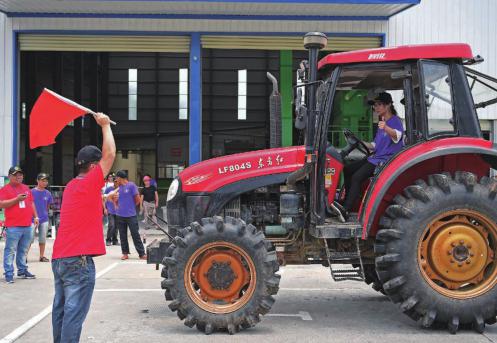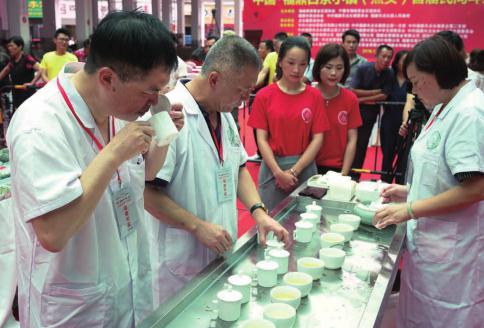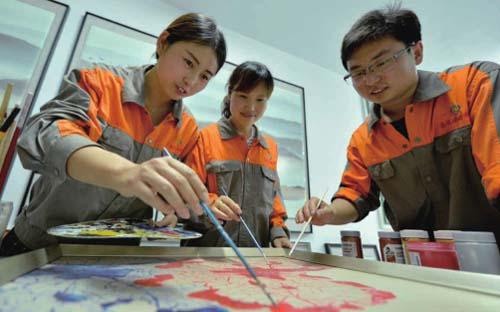Grown-Up Ceremony
2018-07-30
Students celebrate their coming-of-age ceremony at Wuxiang High School in Wuxiang County, north Chinas Shanxi Province, on July 3.
Poverty Alleviation Fund Audit
China has toughened its audit of poverty relief funds to ensure the effective use of hundreds of millions of dollars each year in its latest effort to deliver the promise of wiping out poverty by 2020.
National auditors found misuse of funds totaling 3.98 billion yuan($600 million) in 145 poor counties last year after a three-month audit since January, down 1.6 percent from 2016.
There were lingering problems including ineffective policy implementation, weak fund management, and slow progress in anti-poverty projects, according to the National Audit Offi ce (NAO).
Idle funds still existed. Some 223 million yuan ($33.8 million) of funds designed to support agriculture in poor regions have been put aside for more than two years in 39 counties, and 670 million yuan ($101.5 million) of funds have remained unused for more than one year.
China earmarked more than 140 billion yuan ($21.2 billion) for poverty relief last year, with more than 60 percent coming from the central budget.
Ready to Work
Some four out of fi ve Chinese higher education graduates said they are choosing to get a job, 6.39 percent more than the previous year, according to a recent employment survey report.
Published by leading employment website Zhaopin.com, the report polled more than 90,000 recent university and college graduates.
Zhu Xiaowei, a graduate of China Foreign Affairs University, chose to work for a media company even though he was admitted to a postgraduate program at the same institution.
“Good offers seldom come twice,” he said. “To work for an established company instead of furthering my studies or starting my own business will help me become more competitive in the job market and more fi nancially self-reliant.”
Zhu added, “In the increasingly complex and changing job market, graduates are more cautious in planning their careers.”
China is expected to have approximately 8.2 million higher education graduates this year, 250,000 more than 2017, the report said.
Video Game Addiction
About 18 percent of Chinese youth play online video games at least four to fi ve hours per day, showing signs of addiction, according to recent research.
The report, which appeared in China Youth Daily on July 2, said research on the online behavior of Chinese youth showed that 41.3 percent of young people understand that it is unhealthy to spend too much time on the Internet, but cannot control themselves.
“Internet addiction is relevant to our lives. Almost one in every fi ve young people has already been or is likely to become addicted to video games,” said Zhou Huazhen, a scholar with the Chinese Academy of Social Sciences (CASS) in charge of the research.
It showed that about 23.6 percent of young men played online video games at least four days a week, while 17.7 percent played every day.
The percentage of students who played online games at least four days a week grew with age: 16.9 for elementary school students, 21.3 percent for junior high school students and 31.8 percent for senior high school students.
The two main factors driving the increase are accessibility to digital products and looser parental supervision, said Zhou.
Older children need to use the Internet more often than younger children—both for study and daily life, as well as to meet their social needs—and teachers and parents usually relax their supervision as children grow up, Zhou explained.
Zhang Shuhui, Vice President of CASS, conducted similar research in 2010 with Zhou that showed only 6.7 percent of students at the time spent more than six hours online from Monday to Friday.
Zhang said even with minor differences in parameters between the surveys, the results show an increased Internet addiction among Chinese youth.
Cancer Drug Mark Down
In a bid to reduce the price of cancer drugs, China has included 15 more clinically effective yet expensive cancer medicines on its list of medical insurance reimbursement drugs, according to the state medical insurance administration.
The list now covers a majority of the most frequently used and clinically effective cancer drugs, the administration said.
China exempted all cancer drugs from import tariffs on May 1 in a move to further open up the market to boost their accessibility.
However, since drug inventory imported before May 1 was not affected by the new tariff policy, prices of imported cancer drugs have not yet experienced a substantial decline.
The administration said it will cut the price of cancer drugs on the list via public bidding and procurement, while medical insurance institutions will negotiate with pharmaceutical companies to add cancer drugs currently not on the list to the system.
Since 2016, the government has reached agreements with pharmaceutical companies on the prices of 39 drugs on the medical insurance list—including 17 cancer medicines—with drug prices marked down by over 50 percent on average.
Ready, Set, Go!
A competitor drives a tractor during an agricultural machinery contest in Fengxin County, east Chinas Jiangxi Province, on July 3. About 70 people took part in the competition.
Film Stars and Fake Contracts
China will tighten its regulations on the fi lm and TV industries, targeting fake contracts used for the purpose of tax evasion and exorbitant salaries.
According to a circular jointly issued by multiple departments, including the Publicity Department of the Communist Party of China Central Committee and the State Administration of Taxation, such problems are driving up the production cost of fi lms and TV programs.
Authorities should strengthen supervision on the salary contracts of performers and increase punishment for tax evaders, the circular said.
It also noted that the salaries of performers and TV show guests should be capped.
According to the existing rules, the salaries of performers and show guests should not exceed 40 percent of overall costs, and the leading stars should take no more than 70 percent of the total cast payment.
Government funds are banned from investing in entertainment, commercial movies, TV series and online shows, the circular added.
Data Theft Bust
Police in south Chinas Guangxi Zhuang Autonomous Region announced on June 29 that they have arrested seven suspects for stealing more than 2 billion items of personal data.
The data included peoples e-mail accounts and passwords, ID numbers, cellphone numbers and payment accounts from more than 60 countries and regions, said police in Chongzuo City.
The police found many abnor- mal logins to third-party payment accounts in the city in June 2017 and conducted a month-long investigation to bust the operation in a local community.
The suspects bought personal data for 100 yuan ($15) to 200 yuan($30) per million items, selected valuable information and then sold it at a higher price. In one year, they made hundreds of thousands of yuan from the trade, Chongzuo police said.
The Amazing Race
People take part in a dragon boat race on the Yuxi River between Hanshan County and Wuwei County, east Chinas Anhui Province, on July 3.

New Tariff Cuts
On July 1, China intro duced huge new tariff cuts covering consumer goods and automobiles to help increase imports.
Tariffs on 1,449 taxable consumer goods including home appliances, food and beverages, cosmetics, and medicines were reduced from an average rate of 15.7 percent to 6.9 percent, according to the Customs Tariff Commission of the State Council.
It was the fi fth round of tariff cuts on consumer goods since 2015.
“Signifi cantly reducing the import tariffs on daily consumer goods is conducive to expanding Chinas opening up and serves as a key measure in the countrys initiative to open its market,” the commission said earlier in a statement.
Meanwhile, vehicles and auto parts also saw signifi cant tariff reductions. Tariffs of 20 to 25 percent on cars were cut to 15 percent, and duties on auto parts were lowered to 6 percent from previous levels of 8 to 25 percent.
Analysts believe the intensive measures will help China meet increasing domestic demand, achieve balanced trade and share development dividends with the rest of the world.
“Widened access for foreign goods will allow Chinese consumers to enjoy more quality products and prompt domestic companies to improve their competitiveness,” said Zhang Jianping, a researcher at the Chinese Academy of International Trade and Economic Cooperation.
The move is part of Chinas recent push to further open up its economy, as the country embraces the 40th anniversary of reform and opening up, the primary factor behind its economic success.
Silk Harvest
Farmers tend to mulberry trees in Xinfeng Village in the Hi-Tech District of Haian, east Chinas Jiangsu Province, on July 3. Technicians were sent to guide farmers on how to raise silkworms and apply fertilizer in a scientifi c way.
CIIE in Preparation
As a warm-up event for the upcoming China International Import Expo (CIIE), the 2018 Belt and Road Brand Expo kicked off in Shanghai on June 29.
More than 200 enterprises from 40 countries and regions along the Belt and Road routes showcased their products and services, including food, cosmetics, handicraft, jewelry, clothes and tourism products, at the expo.
“A large number of institutions and associations from countries and regions along the Belt and Road routes have attended the brand expo. They are also looking forward to attending the CIIE in November,”said Yang Jianrong, head of the Council for the Promotion of International Trade Shanghai.
“We have more visitors who are interested in our truffl es and skin care products at the expo this year because of the Croatian teams excellent performance in the World Cup,” said Jonas Huang from the Croatian Chamber of Commerce, adding that more products from Croatia will be on display at the CIIE.
“The CIIE will be a good platform for Croatia to showcase our products and services to the world. It will also facilitate people-to-people exchanges,” said Huang.
With the theme Quality Life to Share, the brand expo ran until July 1 and will travel to Chongqing in November.
Xiongan Airlines
China Southern Airlines, the nations largest carrier by passenger traffi c, plans to establish a wholly-owned subsidiary in the Xiongan New Area, north Chinas Hebei Province, to help the carrier better operate its hub at the new Beijing airport, it said.
With total registered capital of 10 billion yuan ($1.5 billion), the Guangzhou-based airline said it would spend 2.5 billion yuan ($376.8 million) in cash and 7.5 billion yuan($1.13 billion) in tangible assets to establish a unit called China Southern Airline Xiongan Co. in the new area, according to a fi ling released on June 29.
At the new Beijing airport in Daxing District, which is expected to become operational next year, China Southern is aiming for 40 percent of passenger throughput. By 2025, the airline is expected to deploy 250 planes and 900 fl ights at the new airport, it said.
“The establishment of the new subsidiary by China Southern is in response to the call to build and develop the Xiongan New Area,” said Zou Jianjun, a professor of the department of economic management at the Civil Aviation Management Institute of China.
“It is likely that China Southern will operate Xiongan Airlines at the new airport in Beijing, its new hub, if the airline obtains an independent license. Such an arrangement would be convenient for comprehensive operation and management, and the strategic business growth of China Southern,” he said.
Xiongan Airlines will provide international, domestic and regional fl ight services, including the transportation of cargo and passengers, as well as aircraft maintenance and aircraft material sales, according to the statement.
China Mobile Obstructed
On July 3, Foreign Ministry spokesman Lu Kang urged related parties in the United States to abandon their outdated Cold War thinking and concepts of zero-sum games.
His comments came after the U.S. Government moved on July 2 to block China Mobile from offering services in the U.S. telecommunications market, recommending its application be rejected because the Chinese fi rm allegedly posed national security risks.“China always encourages its enterprises to cooperate in accordance with market and international rules and to abide by the laws of the countries they invest in,” Lu said at a daily news briefi ng.“The U.S. should stop its groundless speculation and unreasonable suppression of Chinese fi rms,” he said, adding that it should provide a fair environment for Chinese enterprises to invest and operate in the U.S.
Tea Tasting
Tea experts evaluate the fragrance and fl avor of white tea at a contest in Fuding, Fujian Province, on July 1.
It is the fi rst folk tea contest held by the Cross-Straits Tea Exchanges Association in Diantou Town, which is known for white tea.
CMC Fundraising
Chinese media and entertainment group CMC Inc. said on July 3 that it had raised nearly 10 billion yuan($1.5 billion) from investors including Internet giants Alibaba and Tencent and property developer China Vanke.
Founding shareholders Alibaba and Tencent and new investor China Vanke led the Series A fundraising that valued CMC at nearly 40 billion yuan ($6 billion).
“The global media and entertainment industries are undergoing a new round of adjustment and transformation as the tech revolution drives constant changes in the consumption of content,” said Li Ruigang, Chairman and Chief Executive Offi cer of CMC, which was founded in late 2015.
“As a major economy and consumer market, China has the potential to nurture a new-generation media and entertainment conglomerate,” Li said.
Green Development Boosted
China will further improve its pricing mechanism to encourage environmental protection and green development, according to a guideline issued by the National Development and Reform Commission (NDRC) on July 2. China is aiming to establish a pricing mechanism and policies in favor of green development by 2020. By 2025, the pricing mechanism will be further perfected and fully implemented, said the NDRC.
The pricing mechanism should fully refl ect market supply-demand and scarcity of resources, as well as ecological value and the cost of environmental damage, so as to incorporate ecological costs into economic operation and attract more social capital to the environmental protection sector, the guideline said.
“The new pricing mechanism will focus on prominent environmental issues and let polluters pay the cost,”said Yue Xiuhu, head of the NDRCs price department, at a press conference on July 2.
China will speed up the establishment of a pricing mechanism that can cover the cost of sewage, sludge and solid waste treatment while bringing profi t to these businesses.
Yue said that the government will ensure the quality of peoples livelihood during the pricing reform, and special arrangements will be made to ensure that low-income groups are not affected.
Breaking the Glass Ceiling
Designers paint on glass at a Shahe-based glass company in north Chinas Hebei Province on July 2.
In recent years, Shahe, known as the city of glass, has been committed to developing glass artwork to accelerate the transformation and upgrading of local glass producers.
